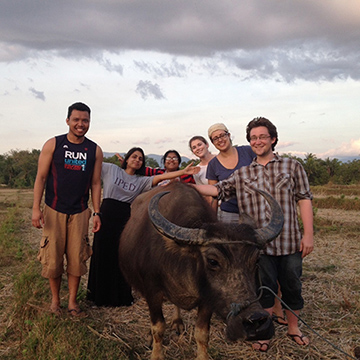Project Assessment in the Philippines

This course trains students to monitor and evaluate (M&E) community level development projects. The program includes three pre-departure lectures and can be credited as a summer course.
Topics
Using the logical framework analysis, frequently mandated by the US Agency for International Development and implemented by many private voluntary organizations such as Catholic Relief Services, students are exposed to various methodologies of designing a results-based system to monitor and evaluate small community development projects. Quantitative methods such as randomization, propensity score matching, and double-difference are reviewed. The course also reviews the use of qualitative survey tools.
A key component of the course requires students to form teams that will conduct field surveys to assess actual local community development projects in the surrounding provinces outside of metropolitan Manila.
The Communities
The Philippines’ rich and vibrant civil society provides us with a large number of community organizations and development projects focusing on fisher folks, farmers, indigenous people, women, the rural poor, and the environment, among others. Students are given a chance to interact with the local communities during their field visits.
To complement our academic programming, our study tour of the Philippines will also include several cultural excursions and social events in and outside of Metro Manila.
Eligibility
Graduate students or undergraduate students able to participate in graduate-level classes are welcome to join through a competitive selection process.
Timeline
- October: Application and interview
- November/December: Pre-departure lectures at Fordham University
- January: Classes and Project Assessment in the Philippines
Financial Aid
Through Fordham’s St. Campion Institute, scholarships to cover the program fee and part of your airfare are available to students committed to applying for prestigious international public policy fellowships such as the UN Young Professionals Program, CRS International Development Fellows, and the Fulbright Clinton Public Policy Fellowship, among others.
Selection Criteria
Successful students must be in good academic standing. Preference will be given to students who, based on their behavioral interview, demonstrate a strong motivation to study project assessment and possess excellent interpersonal skills, effective leadership skills, and proven cultural sensitivity. Preference is also given to students who seek to use this experience to prepare for a relevant international prestigious fellowship.